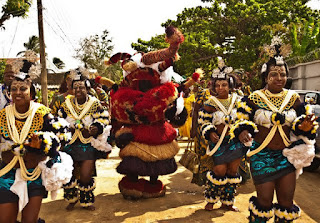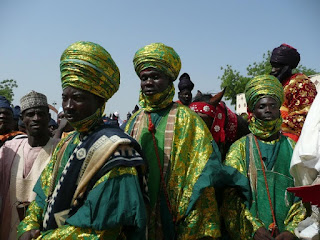A Brief History of the Efik By Onoyom Ukpong, Ph.D.
A Brief History of the Efik By Onoyom Ukpong, Ph.D.
The Efik are an ethnic group settling along the Cross River estuary and the banks of the Calabar River in Nigeria and in the western Cameroon vicinity. The history of their origin and settlements dates back to the fourteenth century A.D., following their migration from Uruan in the thirteenth century, and to the years that marked their first settlement at Ikpaene prior to them arriving at Creek Town and the rest of their present riverine locations. In the antiquity sense of the name, Efik (which derives from the Hebrew word Aphik or Hepik) is synonymous with
Old Calabar—both names have been used interchangeably in nearly all historical accounts of the Efik for over six centuries (from the fifteenth to the twenty-first).
The Efik aboriginals are recorded to have migrated from Palestine, following the Roman conquest in 63 B.C. and the resulting revolts against the conquest in the first and the second centuries A.D., drifted through Egypt and the Nile into ancient Nubia and passed through Sudan into Nigeria in the tenth century A.D. to establish the City-States (clans) of Old Calabar in the southeastern part of the country. The twelve original clans sojourned at Ibom in Aro-Chukwu and later left this area finding residency in such places as Enwang, Eniong, Ito, Ukwa and Eki, where, to this day, they are neighbors to Umon, Agwagune, and Aro-Chukwu; however, those who kept themselves together in the area covering Uruan, Ikpaene, Creek Town, and Calabar later constituted themselves into “Esien Efik Itiaba” (the seven Efik Clans), excluding Enwang, Eniong, Ito, Ukwa and Eki.
Therefore, the answer to the question of the Palestine origin of the Efik rests compellingly on the Akak Theory—as it does on Hope Waddell’s—advancing proof of origin based on the Efik retention of aspects of the Oriental culture partly due to the ever abiding Jewish names among the Efik (such as Ephraim and Adam), and partly the argument that the Nsibidi pictographic script of the Ekpe fraternity of the Efik is reminiscent of the Egyptian Hieroglyphics. The former position has credence given the long history of shared tradition of naming between the Efik and early Oriental people; one in which, in the 1980s, His Royal Highness the Obong of Calabar and Paramount Ruler of the Efik, like some of his predecessors, was seen to have taken on a Jewish name (Bassey Eyo Ephraim Adam III [see Gen 41:52]) in addition to the Hebrew-derived name of the late prominent Efik economist, historian and social scientist Chief (Dr.) Eyo Okon Akak Ido (see 1 Chronicles 6:21) and given the following Efik names that derive from the Orient:
Asari (Ef.) Azhari (Ort.);
Akak (Ef.) Akkad (Ort.);
Abasi (Ef.) Abisah (Ort.);
Andem (Ef.) Anem (Ort.);
Duke (Ef.) Duke (Ort.);
Edem (Ef.) Edom (Ort.);
Etinyin (Ef.) Atheni (Ort.);
Efik (Ef.) Aphik (Ort.);
Itam (Ef.) Etam (Ort.); and
Ekanem (Ef.) Elkanem (Ort.).
Also, the word Eburutu (as in Efik Eburutu) is believed to have adapted from the word Hebrew.
The Efik group originally comprised of twelve City-States. An explanation for the adage: “ami eyen ndem efik esien duopeba” (‘I, the descendant of the Efik tutelary Ndem [god] of the twelve clans’). Later, these twelve States or clans adapted to “Esien Efik Itiaba” (the seven Efik States) having separated from Enwang, Eniong, Ito, Ukwa and Eki; however, these were in 2011 reconstituted into the original twelve City-States by the incumbent Obong (His Eminence Edidem Ekpo Okon Abasi Otu V). The Efik of Old Calabar were literate and enterprising, partly because of the privilege to have had early contact with the European traders and partly due to their unprecedented interest in formal education and commerce
More details here



Comments
Post a Comment
Please leave your comments with us to enable us serve you beter